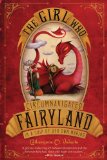
 The Girl Who Circumnavigated Fairyland in a Ship of Her Own Making
The Girl Who Circumnavigated Fairyland in a Ship of Her Own MakingReview posted 1/23/2013.
Feiwel and Friends, New York, 2011. 247 pages.
Starred Review
I've been meaning to read this book for a long time. I finally did so on the excuse that the sequel has come out, and I now I want to read both.
The Girl With the Very Long Title, as my friend calls it, reminds me a bit of Alice in Wonderland, because of the style of the illustrations, combined with one strange thing after another happening to the heroine, September, in seemingly random order.
The narrator has a strong voice. In many cases, the narrator treats the reader as a child, which seems reasonable.
By the time a lady reaches the grand, golden evening of her life, she has accumulated a great number of things. You know this -- when you visited your grandmother on the lake that summer you were surprised to see how many portaits of people you didn't recognize hung on the walls and how many porcelain ducks and copper pans and books and collectible spoons and old mirrors and scrap wood and half-finished knitting and board games and fireplace pokers she had stuffed away in the corners of her house. You couldn't think what use a person would have for all that junk, why they would keep it around for all this time, slowly fading in the sun and turning the same shade of parchmenty brown. You thought your grandmother was a bit crazy, to have such a collection of glass owls and china sugar bowls.
In several other places, the reader is addressed as a grown-up, which seems perhaps out-of-place, although it certainly applied, in my case:
You and I, being grown-up and having lost our hearts at least twice or thrice along the way, might shut our eyes and cry out, Not that way, child! But as we have said, September was Somewhat Heartless, and felt herself reasonably safe on that road. Children always do.
Still, this book gives an enjoyable trip through Fairyland, which quickly becomes for September about saving her friends. I'm not completely sure I would have liked it when I was a child, but then, I didn't like Alice in Wonderland then either. And I am still looking forward to seeing what the sequel is like. The book is full of imaginative details and fairyland logic, which isn't quite the same as real-world logic. There were some statements from the narrator I particularly liked:
Stories have a way of changing faces. They are unruly things, undisciplined, given to delinquency and the throwing of erasers. This is why we must close them up into thick, solid books, so they cannot get out and cause trouble.
"When you are born," the golem said softly, "your courage is new and clean. You are brave enough for anything: crawling off of staircases, saying your first words without fearing that someone will think you are foolish, putting strange things in your mouth. But as you get older, your courage attracts gunk and crusty things and dirt and fear and knowing how bad things can get and what pain feels like. By the time you're half-grown, your courage barely moves at all, it's so grunged up with living. So every once in a while, you have to scrub it up and get the works going or else you'll never be brave again. Unfortunately, there are not so many facilities in your world that provide the kind of services we do. So most people go around with grimy machinery, when all it would take is a bit of spit and polish to make them paladins once more, bold knights and true."
That's the kind of fun observations and magical details you'll find in this book.
